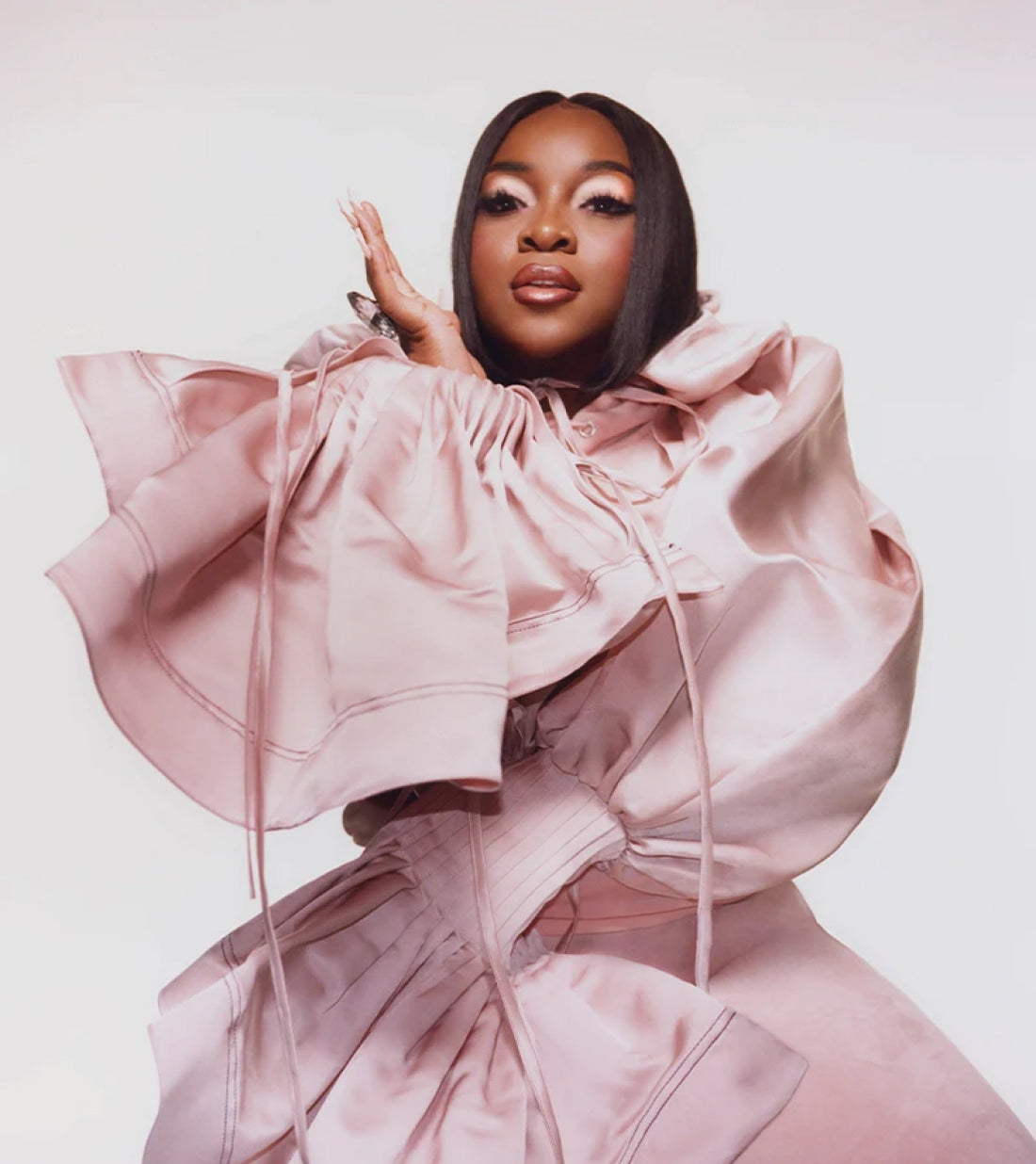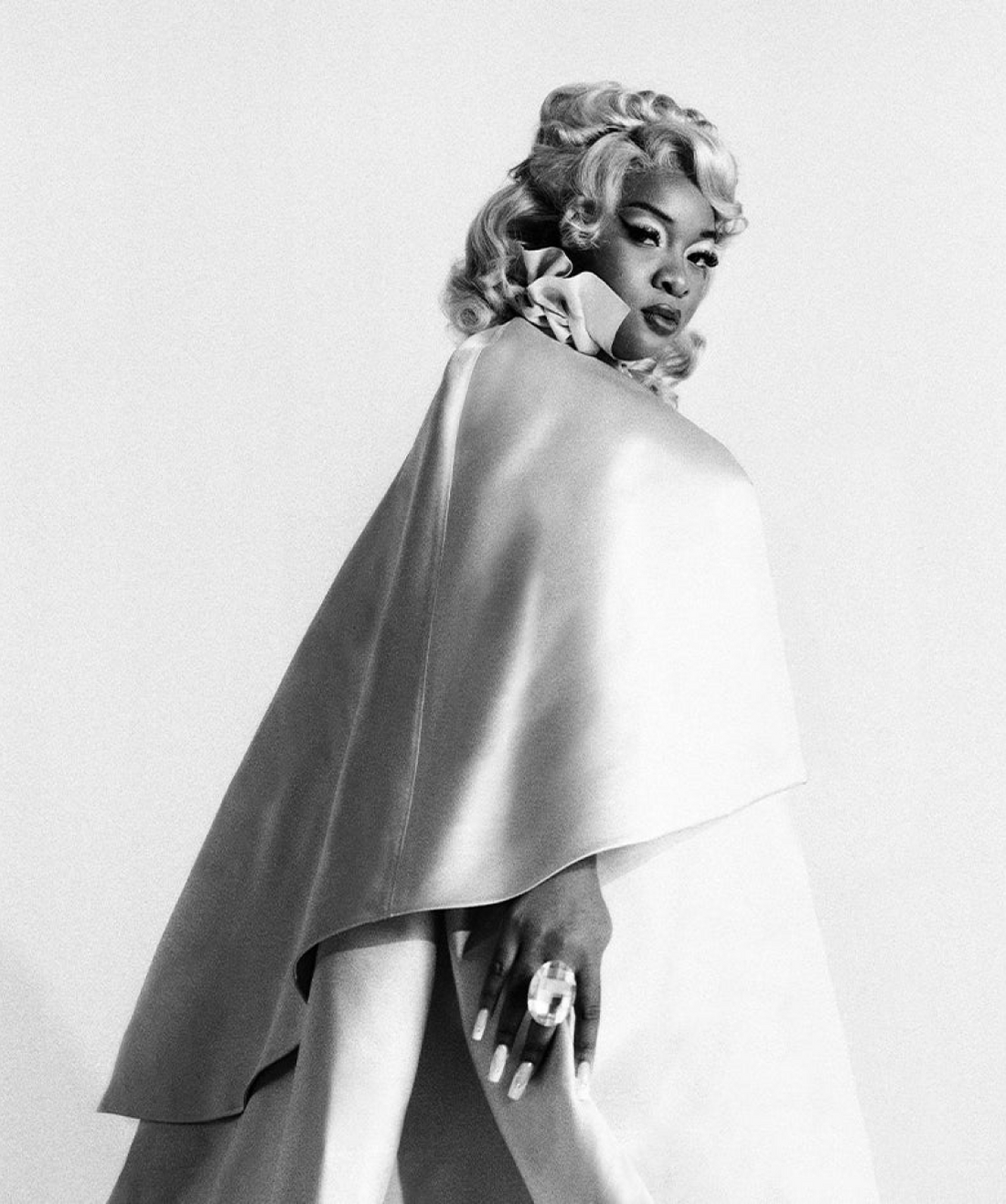Ray BLK is sitting in front of a giant painting that takes up much of the wall behind her. The image is a scene from her very first music video (for the song “5050”) and was created by a fan. “When she uploaded it onto Instagram, I thought it was A3. She asked me if I wanted it and I did, then she told me the dimensions and I was like, ‘Oh, it’s huge!’” The vast expanse of the artwork is appropriate. There can be no containing Ray BLK - the B-L-K of her stage name stands for Building, Living, Knowing - to a page the size of a broadsheet newspaper. Born in Nigeria and raised in Catford, South East London from the age of four, she was 23-years-old when the critical and cultural success of her debut EP Durt saw her win the prestigious BBC “Sound Of” poll back in 2017, the first ever black woman and the first ever fully independent artist to do so. Soon after she signed to Island Records and began the long, at times fraught, journey to get to this point, where we are speaking about her first album, slated for release in June. In the intervening four years, that record has morphed and evolved, due in the most part to the fact that Ray herself has experienced her own evolution. Early comparisons with Lauryn Hill initially boxed her in creatively, and her “Sound Of” accolade was both a blessing and a curse, making her second guess herself and feel as though she had to adhere more to the style of winners that had come before her, such as Sam Smith and Adele. “I really thought I was gonna make this acoustic, stripped back, melancholic, woke album because that was what I felt people wanted me to do. I thought I needed to be super mature and played on Radio 2… but that’s not even what I listen to, day in day out.”

The lack of representation for artists that look and sound like Ray didn’t help with her feelings that she needed to conform to achieve. “I was very much reminded that I was doing something different, but I didn’t receive that as a good thing because what is different is not what I’m seeing in the charts”, she says. She did write those stripped-back songs, for 2018’s Empress EP, and then having done what she thought other people wanted her to do, she decided that what she did next would be for satisfaction of her own ambition - to make “a classic - something that we can listen to and relate to in every era.” Having spent two days with an advance stream of the album prior to our chat, and umpteen more plays after, it is clear that the pressure - both internal and external - that Ray speaks repeatedly to having been under, has over time, generated a diamond. “I really wanted to give a clear picture of where I was mentally,” she says, of the writing process. “I was in a place where I was really struggling to let people into my life and I felt like I was putting up a lot of walls, whether in relationships or friendships. I also felt I was carrying a lot of heaviness around experiences I had in the music industry and so I wanted to channel that into my music.” What made Ray build walls around herself? “That’s something I’m trying to discover with my therapist,” she says. “But I think it comes from fear of being hurt. I know who I am and I’m the sort of person who loves really hard and so when you don’t receive that love back, it can be very painful.” There may also be another reason, rooted in Ray's childhood. “Being raised by an immigrant who didn’t have her papers at one point and was a single mum, I feel like a lot of her fear was put on us, that thing of ‘don’t tell anybody this, don’t tell people what’s going on at home,’” she recalls. “Sharing information is how we build intimacy with a friend or in a relationship, but I was raised to be schtum because you can’t trust anybody with your personal information.” Although she had previously thought “I’ve shared things about myself in my music, I realised I really haven’t”, something she attributes to how vulnerable it is to say certain things out loud, “and then put that on record for everybody to hear!” She is already excited for her next record, because she is ready to be more open about her own feelings - producer PRGRSHN is someone she feels comfortable enough with to really pour herself into her music. That is, of course, if a second album is on the cards at all. “Every couple weeks I have a breakdown and I’m like, I’m done with music. I’m just gonna do this one album and then I’m gonna focus on some philanthropic work, that’s what’s really in my heart and that’s what I care about. And then the next week I’ll have all of these ideas, and I’ll be creating a moodboard of all the new stuff I’m gonna make and feel super creative.” There are various causes dear to Ray’s heart - support for young carers (“my brother is disabled”), support for young people experiencing domestic violence (“I watched my mum go through that”) - but the topic she speaks on at length is education for girls from underprivileged backgrounds like her own, education that goes beyond the curriculum. “Growing up I always had these big ambitions, but they felt so far away because I wasn’t told at the school I went to that I can achieve anything,” she says. “I just felt like we weren’t really given the tools to exercise our capabilities… in fact, our ambitions were reduced.” She has already started partnering with charities, doing talks designed to inspire the students she visits, but she is keen to do more to spread education around finance management, sexual health, and other crucial adult skills not taught in schools. It would be a detriment to the culture if she didn’t somehow manage to give her all to both music and activism. The opening track of the album speaks to Ray’s vision of herself as an icon, an aspiration she has held since she was a little girl. As Ray closes our conversation by reflecting on those long-held ambitions, she considers how her own idea of what iconic status means has changed over the years, and how much that new view of success has empowered her to remain true to herself. “I always had this thing in my head that to be a star, or be received as a star, I need to look a certain way, or present myself in a way that has this aura of fabulousness that people want to aspire to. Then I realised that what people actually love me for is me in my rawest form. A girl from South London, who has something to say.”

